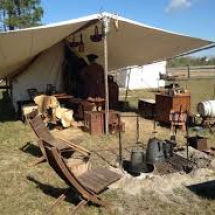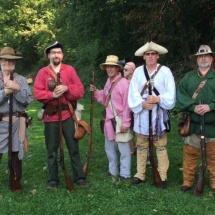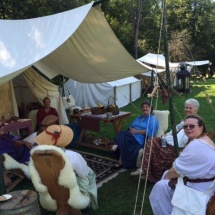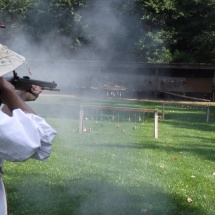Blackpowder Overview
We are the Black Powder group here at WWCCA and we’d like to welcome you to the Club.
We encourage you to attend the various meetings and get involved in all the activities available here at the club. Get to know people and ask questions. That’s the best way to navigate around and enjoy the place. If you don’t feel comfortable participating yet, then just come out and watch how things are done. Eventually you will get to know people and realize we’re all here for one main purpose…to have fun!!!
Our particular group, the Tonquish Muzzlerloaders of WWCCA, have our monthly meetings on the second Thursday of each month, at 7:30 p.m. Open to members you are encouraged to come out and introduce yourself. We are very eager to share our hobby with anyone who may be curious, so come on by! Our shoots consist of a monthly “walkthru” which is a variety of targets we’ve set up in the woods beyond the wall along the 200 yard range. The entrance to the walkthru is at the very southeast corner of the 200 yard range parking area. There is a sign marking the entrance. These walkthru’s are usually the first Sunday of every month, depending on our event schedule for that month, and usually at 10:00 a.m. However, read your “Clubhouse Window” to make sure as these dates change on occasion depending on our schedule. We also shoot sometimes on Saturdays and Wednesdays.
We hold to major Rendezvous’ every year here at the Club. The big one is the annual “Labor Day Weekend Rendezvous”, which is the largest primitive Rendezvous held in the state of Michigan. The other one is “The Wintering” held on the last full weekend of January. A much smaller affair but every bit as enjoyable as the other. We sometimes have a small campout on Memorial Day weekend, and sometimes also on the July 4th weekend, and these are very relaxing events as well.
Our Chairman is Greg “Shortcut” Baack. His phone number is on page 2 of your Clubhouse Window newsletter.
See below to see what it is that we do!!!
Blackpowder Monthly Article
January 1,1776 -184 days to the Declaration of Independence. The Boston Massacre, Boston Tea Party and “the shot heard around the world” have already occurred. There is continued colonial frustration with British policies like the Stamp Act and Townshend Acts. Colonial forces under the command of George Washington continue their siege of Boston and the British Troops occupying it.
On January 1, 1776, British ships under Lord Dunmore, governor of Virginia, bombard the town of Norfolk, Virginia. Since April of 1775 and the battles at Concord and Lexington, Patriots and Tories have clashed over British attempts to confiscate gunpowder and flintlocks stored throughout the colony. Battles between British troops and American militia has led to Dunmore’s withdrawal from Norfolk onto British ships in the harbor. Norfolk is under American control. Commanding those forces is Colonel Robert Howe (not to be confused with General Howe who was at this time in command of the British forces in the colonies). The American forces had denied provisions to the British ships. They were also a little cocky parading themselves on the wharves of Norfollk and using the warehouses there to snipe at British soldiers and sailors. Unknown to Lord Dunmore the Americans had already decided that they could not defend the city from the ships and the troops on them. So when the British began to bomb the wharves the Americans helped the conflagration along by also setting fires. The decision had been made to “leave nothing for the British”. Particularly so as the local merchants were vocal Tories (colonist loyal to the King in this dispute). The assistance of the militia in burning Norfolk was not really known for sometime after the event. Therefore the burning of Norfolk was widely used as an example of what happens under tyrannical rule to recruit supporters of the revolution.
January 2. The Continental Congress passes a resolution, known as the “Tory Act”, which outlines how colonies should manage Loyalists, recommending that they be disarmed and the most dangerous among them held in custody.
January 5. New Hampshire becomes the first colony to adopt a State Constitution, an important step in replacing British authority with locally created government.
January 10. Thomas Paine’s influential pamphlet Common Sense was published. It was written in clear simple language to argue for the independence of the Thirteen Colonies from British rule. It was widely read and very persuasive.
January 20. South Carolina Loyalist, led by Robert Cunningham, sign a petition from prison, agreeing to all demands for peace by the formed state government of South Carolina. In essence they lament the divisions created amongst the people over independence, apologize for their having taken the wrong view in that dispute, and promise to behave like good Patriots should they be released. The majority are taken for their word and are released. Several are not trusted and remain in prison.
January 24. In May of 1775, Ethan Allen and his Green Mountain Boys, together with Benedict Arnold commanding volunteers from Connecticut and Massachusetts, surprised and overtook a small British garrison at Fort Ticonderoga. Later, under orders from General Washington, Henry Knox would travel to the fort, organize and lead a removal of the 59 artillery pieces from the fort, packing them up, pulling them with oxen over 300 miles through frozen lands to deliver them to Boston. There Washington would the artillery mounted on Dorchester Heights, overlooking Boston and force a British evacuation of the city March 17, 1776.
The march towards declaring independence continued.
Now the Tonquish Muzzleloaders events for January 2026 are: Our monthly walkthrough is on January 4th and our monthly meeting is January 8th. The big event for January is the Wintering. We will be camping from the 23rd to the 25th with the shooting competition on Saturday 12ish. The event is $15 for the weekend. The shooting match is for muzzleloaders with a patched roundball only. This is a more casual event then our Rendezvous but period correct clothing is encouraged. Except boots can be modern.
On another note, Robbie Burns Day is the 25th but we will probably celebrate the great bard on the 24th with a poem and a toast. I doubt we will wear the kilts but you never know.
Keep your fires lit and your cabins warm
Spellbinder



